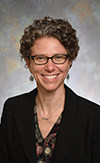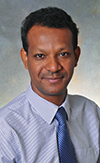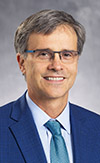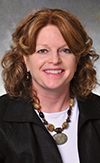
Cardiovascular Disease Fellowship
Three-Year Fellowship
About the Program
The cardiovascular disease fellowship is a 3-year ACGME accredited program at Hennepin Healthcare and Minneapolis Heart Institute at Abbott Northwestern. Its primary objectives are to train fellows to meet their unique career objectives while developing clinical excellence and scholarship. The program accepts 2 fellows per class with an additional fellow every third year for a total of 7 fellows each year. The small fellowship size within two large tertiary referral hospitals ensures unprecedented learning and scholarship opportunities for the trainees.
Dedicated Clinician Educators
The fellowship faculty are dedicated clinician-educators in the field of general and subspecialty cardiology. Many faculty share their expertise as guideline authors and journal editors. The training sites lead or participate in hundreds of cardiovascular clinical trials annually. Faculty and fellows use the latest technologies to provide cutting-edge care in all subspecialty fields of cardiology.
What to Expect
Over three years, fellows work one-on-one with faculty to refine their skills and see firsthand best practices in cardiovascular disease diagnosis, management, procedures, and processes. In addition, fellows develop their leadership and teaching skills as supervisors to residents and students. Fellows have protected time for weekly didactics and continuity clinic. The fellowship is unique in the extent to which trainees can customize their educational experience to ensure they meet their career objectives. Graduates go on to be competitive applicants for both academic and non-academic general cardiology employment as well as subspecialty fellowships.
The fellowship is proud to offer a broad training experience in all aspects of cardiovascular medicine including but not limited to the following:
- Cardiovascular disease prevention
- Interventional cardiology
- Structural heart disease
- Electrophysiology
- Adult congenital heart disease
- Cardiovascular imaging (echo, nuclear, CT, MRI)
- Advanced heart failure, mechanical circulatory support, and cardiac transplantation
- Pulmonary hypertension
- Vascular medicine
- Cardiovascular research
In addition, the following advanced fellowships are offered internally:
- Advanced Heart Failure and Transplant Cardiology
- Interventional Cardiology
- Structural Heart Disease
We encourage interested applicants to spend some time exploring the content of this site and reach out if there are unanswered questions.
Application Requirements
Applications Due: September 2
Requirements
- All applicants who are interested in pursuing training at Hennepin Healthcare and Minneapolis Heart Institute at Abbott Northwestern Hospital Cardiovascular Disease Medicine Fellowship Training Program who provide and meet the following criteria will be considered. At Hennepin Healthcare and the Minneapolis Heart Institute, we are committed to creating a culturally competent and inclusive work and care environment where all employees, patients, patients’ family members, volunteers, and business partners are treated with fairness, dignity, and respect without regard to race, color, creed, religion, national origin, gender, sexual orientation, gender identity, disability, age, marital status, or veteran status.
- Applications are accepted only through the Electronic Residency Application Service (ERAS). We do not accept applications through email or regular mail.
- Show completion or status of good standing in a three-year ACGME-accredited Internal Medicine residency program
- Medical School Diploma and transcripts
- Transcripts for the United States Medical Licensing Exam (USMLE) Part I, II, and III (if completed)
- Curriculum Vitae
- Three letters of recommendation (one must be from the Program Director)
- Personal statement
- ECFMG Certificate for international medical graduates (graduates from medical schools outside of the US or Canada).
- Recent photo
- Applicants who are not United States Citizens or permanent residents (Green Card holders) must process a J-1 visa from the ECFMG and State Department.
- Unfortunately, the program does not sponsor H1-B visas.
- After applications have been reviewed, invitations for an interview will be sent via email/ERAS approximately 10-14 days prior to the interview dates. We conduct interviews in September and October.
- All invited applicants (in-state or out-of-state) will be interviewed either in person or virtually (video-assisted). Detailed instructions will be provided when invited for an interview.
- The fellowship selection committee will score each applicant and develop a rank list based on the following criteria:
- Demonstrated clinical excellence and professionalism during the Internal Medicine residency
- Scholarly activity and publications
- Honors and accomplishments
- Letters of recommendations
- Interviews
- Medical School transcript
- The Fellowship Program participates in the National Resident Matching Program (NRMP).
Curriculum/Education/Research
Didactics
-
- Monday morning Fellow Grand Round Presentations (mandatory)
- Tuesday cath conference (mandatory)
- Wednesday afternoon lecture series (mandatory)
- 3-4 hours of protected fellow education time
- No clinical obligations Wednesday afternoons or evenings
- EKGs, journal club, board review, fellow-selected topics/speakers
- Monthly echo conference (optional)
- Weekly valve conference (optional)
- Weekly vascular conference (optional)
- Weekly EP conference (optional)
- Weekly adult congenital heart disease conference (optional)
- Quarterly nuclear cardiology conference (optional)
- Special events
- Hands-on heart dissection and LVAD lab
- Quarterly ECMO and Cardiohelp hands-on training
- Simulation Center Training
- Hands-on annual Jesse Edwards Registry lab
Rotation Schedule
The fellow training experience is split equally between the two training sites. The basic outline for each academic year is outlined here. The first two years focus on core clinical rotations to meet ACGME requirements and the third year is largely customizable to meet each fellow’s unique career objectives. Fellows may spend up to 6 months in research.
Year 1: Core curriculum
-
-
- Inpatient service and consultations including ICU/CCU
- Cath lab
- Echo lab
- Nuclear cardiology lab
- Heart failure, VAD, transplant service, ECMO
- Continuity clinic
-
Year 2: Core curriculum + electives
-
-
- Same inpatient, clinic, and imaging rotations as Year 1
- EP
- Nuclear imaging
- CT
- Cardiac MRI
- Electives
-
Year 3: Electives for sub-specialization and career development
-
-
- Custom schedule based on fellow choice and career goals
- Opportunities for 6+ months of prevention, interventional, EP, or advanced imaging experience
-
The above rotation schedule allows fellows the opportunity to achieve a minimum COCATS level 2 certification in all desired training areas over the 3-year program.
Rotations available:
-
-
- Inpatient consults - general and CCU
- Heart failure, MCS, transplant, pulmonary HTN - outpatient and inpatient
- Interventional Cardiology
- Echocardiography
- Nuclear Cardiology
- Cardiac CT
- Cardiac MRI
- Electrophysiology
- Cardiovascular prevention
- Adult congenital heart disease - outpatient and inpatient
- Continuity clinic
- Specialty clinics
- Valve Clinic
- Aortic disease clinic
- Hypertrophic cardiomyopathy clinic
- Vascular medicine clinic
- Adult congenital heart disease clinic
- Heart failure, transplant, and VAD clinics
- Electrophysiology clinic
- Genetic arrhythmia clinic
- Prevention clinic
- Lipid Clinic
- Refractory angina clinic
- International cardiology
-
International Experience
Cardiology faculty at both institutions make nearly annual trips abroad to learn, practice and teach. All international work has been in Africa. Fellows have the opportunity to spend up to 4 weeks abroad and have previously traveled to Ethiopia, Kenya, and Togo. The work abroad has included the development of the following:
-
-
- Cardiovascular disease training program
- Stress echo program
- Mitral valvuloplasty programs
-
Research
Fellows have the opportunity to devote up to 6 months of training time to scholarly activities. Fellows have used this time to publish many peer-reviewed manuscripts since the program's inception in 2011. The fellowship has excellent support for research and scholarship at both sites. Research staff including statisticians and project managers are available to collaborate on scholarly endeavors. Both training sites have full-time librarians and library technicians to help with literature searches and article acquisition. Fellows are encouraged to present their scholarship at local, regional, and national meetings with recent representation at annual ACC, AHA, HFSA, ISHLT, HRS, TCT, and ASE conferences.
Faculty
Cardiovascular Disease Fellowship Training Program Team
Michelle Carlson, MD, FACC
Program Director
Assistant Professor of Medicine, University of Minnesota
Director of Echocardiography Laboratory
Hennepin Healthcare
Mengistu Simegn, MD FACC, FASE
Associate Program Director
Assistant Professor of Medicine, University of Minnesota
Hennepin Healthcare
Kevin Harris, MD, FACC, FASE
Site Program Director
Director of the Aortic Dissection Program and member of the International Registry of Acute Aortic Dissection (IRAD)
Minneapolis Heart Institute and Abbott Northwestern Hospital
Louis Kohl, MD, FACC, FASCI
Core Faculty, and member CCC/PEC
Site Program Director, Interventional Cardiology Fellowship Program
Assistant Professor of Medicine, University of Minnesota
Interventional Cardiologist, Hennepin Healthcare
Victor Cheng, MD, FACC, FSCCT
Core Faculty and member CCC/PEC
Advanced Cardiovascular Imaging
Minneapolis Heart Institute and Abbott Northwestern Hospital
Cheryl Christenson
Senior Program Coordinator
Cardiology, Interventional, Advanced Heart Failure Fellowship Program
Telephone: 612-873-9990
Email: [email protected]
Meghan Hoover
Site Program Coordinator for Cardiology, Interventional, Structural, and Advanced Heart Failure Fellowship Program
Telephone: 612-863-1675
Email: [email protected]
Hennepin Healthcare Cardiology Faculty
Hennepin Healthcare Research Institute
Minneapolis Heart Institute Faculty
Abbott Northwestern Hospital Internal Medicine Residency
Training Sites
The fellowship experience is split equally between two complementary training sites one mile from each other in Minneapolis, MN. Both sites were previously training facilities for the University of Minnesota cardiology fellowship program for over 30 years before launching their own fellowship in 2011.
Hennepin Healthcare's HCMC campus
- Downtown Minneapolis
- Urban safety-net hospital
- 450 beds
- Level 1 Trauma Center
- Community-academic medical center
- A fully trainee-run institution with all services managed by house staff from HCMC or the University of Minnesota residency and fellowship programs
- 11 cardiologists on staff
- Primary site for
- Minnesota Heart Failure Consortium
- Scientific Registry for Transplant Recipients
- Chronic Disease Research Group
Minneapolis Heart Institute at Abbott Northwestern Hospital
-
- MHI Fellowship Program
- South Minneapolis
- Tertiary cardiac referral center for a large regional health system including over 100 clinics and 11 hospitals
- 630-bed hospital
- Over 50 cardiologists on staff with Minneapolis Heart Institute
- Large integrated high-volume cardiovascular service line
- Annual volumes
- Echos 45,000
- Cardiac CT 6,900
- Cardiac MRI 4,000
- Nuclear Medicine: 3,100
- Cardiac Cath/PCI: >6,000
- EP Ablations/Devices 2,200
- LVADs >40
- Heart Transplant (15/year, 93% 1 year survival)
- VA-ECMO > 75 year (National leadership, ELSO)
- Minneapolis Heart Institute Foundation (MHIF)
- Active clinical research organization within Minneapolis Heart Institute
- Over 200 peer-reviewed manuscripts annually
The two hospitals offer a well-balanced training experience that includes all aspects of community and advanced cardiovascular care. Fellows graduate as highly skilled general cardiologists or competitive candidates for subspecialty fellowships.
Salaries and Schedules
Salary and benefits
- Hennepin Healthcare resident/fellow benefits: Graduate Resources
- Additional benefits include:
- Meal stipend at each facility
- Free covered parking at each facility
- Office space at each facility
- $2000 annual education stipend
Call Schedule
- 2-3 days of weekday home calls per month
- 15-weekend calls per year
Moonlighting
- Licensed fellows are welcome to moonlight within and outside the program facilities within ACGME work-hour standards
- Moonlighting opportunities are hosted at the training sites:
- Overnight hospitalist shifts at HCMC
- Weekend daytime rounding on consult service at ANW
Vacations
- Fellows have 21 weekdays of vacation and 1 week of educational leave each year
What Sets Us Apart?
Commitment to education.
Training isn't a sideline at Hennepin Healthcare and Minneapolis Heart Institute at Abbott Northwestern Hospital; it's a core part of our culture, reflected in our emphasis on learning, innovation, and collaboration. Nearly 300 physicians study with us each year as residents, fellows, and medical students. After 40 years of educating cardiovascular specialists in partnership with the University of Minnesota Medical School, we launched our own Cardiovascular Disease Fellowship and enrolled our first fellows in 2011.
Focused clinical approach.
Cardiovascular education at Hennepin Healthcare and Minneapolis Heart Institute means practical, hands-on training to produce the best specialists in the field. From day one, our fellows experience the full spectrum of cardiovascular cases, from prevention to cardiovascular diagnostic and interventional procedures to advanced heart failure and transplants.
Individual attention and leadership.
Our program offers unprecedented learning and leadership opportunities. Every day, we pair each fellow with a faculty member for all clinical activities. In addition, Hennepin Healthcare's role as a major public teaching hospital allows fellows to consult with patients and providers across the organization, and to act as a resource for residents, medical students, and subspecialty fellows.
Cutting-edge equipment and procedures.
Our facilities and our curriculum integrate the latest technology. Fellows learn and utilize our advanced cardiovascular imaging system, including myocardial perfusion imaging, CT, and cardiac MRI, integrated Epic electronic health records, Interdisciplinary Simulation and Education Center, new electrophysiology lab, and other state-of-the-art tools.
Diverse case mix.
Few settings offer the range of clinical experience available in our program. At Hennepin Healthcare, the region's safety net hospital and Minnesota's busiest emergency department, fellows work in a high-volume setting to treat patients from varied ethnic and economic backgrounds. Practice at Minneapolis Heart Institute at Abbott-Northwestern Hospital exposes fellows to a tertiary cardiology referral and research center that is the primary referral center for more than 100 clinics and 11 hospitals in Minnesota.
Clinical research opportunities.
Our fellows learn and conduct clinical research as a key component of their education. Both organizations host active research programs and maintain their own research foundations.
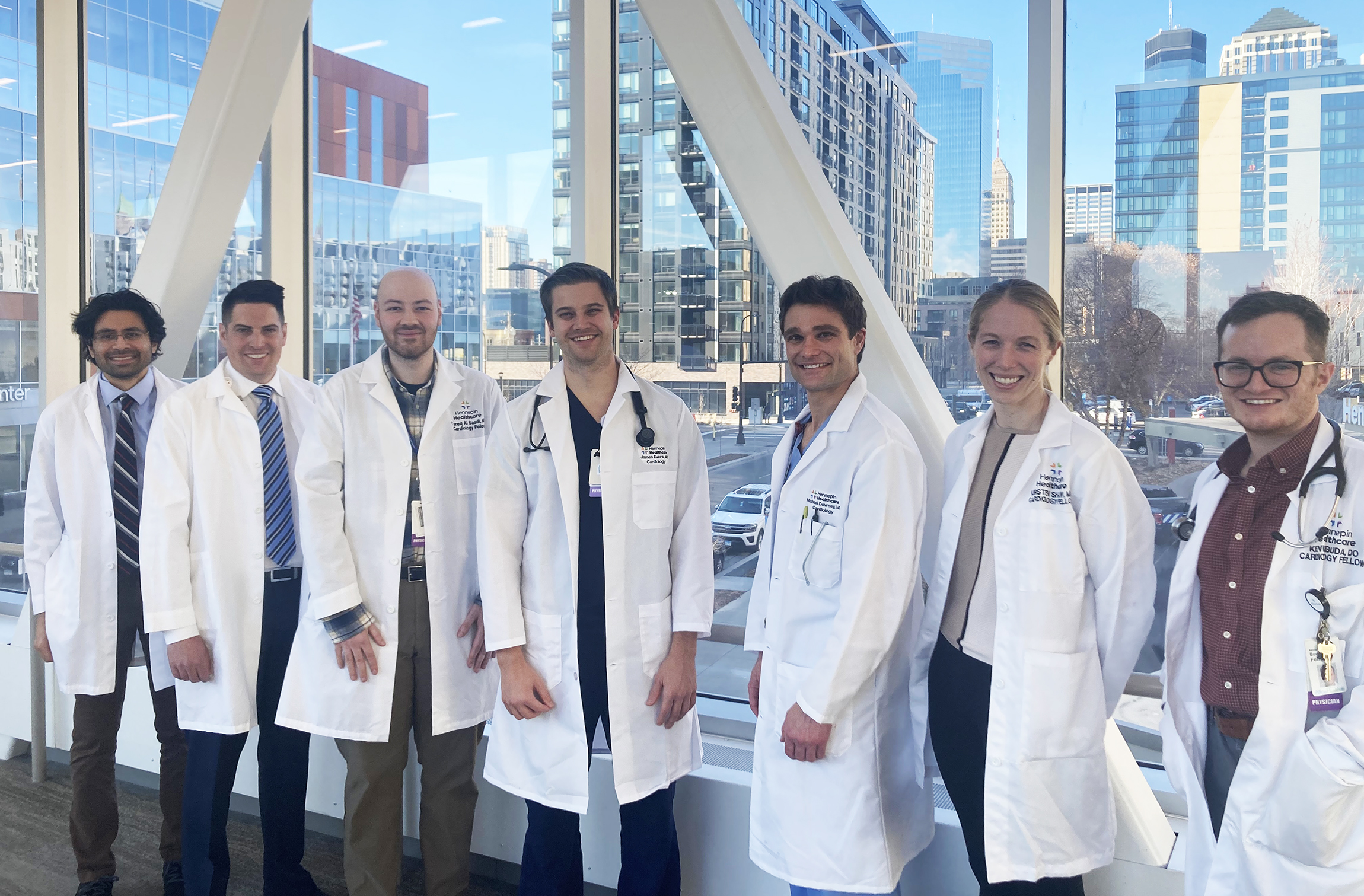
About Our Facility
Fellows rotate equally between two leading hospitals in Minneapolis to experience firsthand the day-to-day operations of a major public hospital and a tertiary cardiology referral and research center practice.

